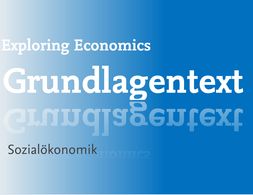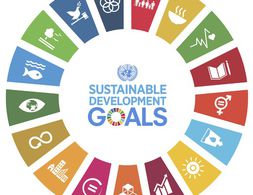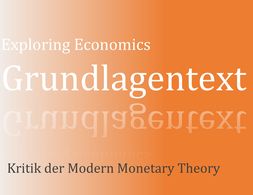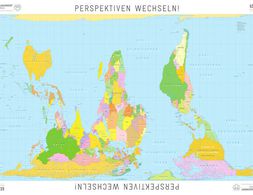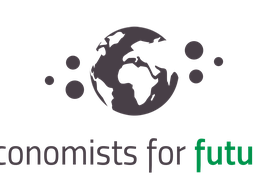738 Ergebnisse
Die Sozialökonomik ist 1. die historische Fachbezeichnung einer integrierten Sozial- und Wirtschaftswissenschaft (vgl. Einzelwissenschaft, Disziplin) und 2. ein kontextabhängiger Ausdruck für komplexe Zusammenhänge von Gesellschaft und Wirtschaft (vgl. Sozialökonomie bzw. Sozioökonomie).
This course is designed to provide students with an understanding of work-related gender issues and to enable students to analyze the issues using the tools of economics.
An examination of women's changing economic roles. Includes an analysis of labour force participation, wage inequality, gender differences in education, intra-household distribution of resources, economics of reproduction, and how technological change affects women.
Whether a black swan or a scapegoat, Covid-19 is an extraordinary event. Declared by the WHO as a pandemic, Covid-19 has given birth to the concept of the economic “sudden stop.” We need extraordinary measures to contain it.
Der Beitrag befasst sich mit der Schaffung finanztheoretischer Rahmenbedingungen hinsichtlich einer sozial-ökologischen Transformation der heutigen Wirtschaftsweise durch gezielt-effiziente Anpassung der Geschäftstätigkeit des globalen Bankensektors unter Betrachtung der resultierenden Folgewirkungen zwecks hinreichender Zielerfüllung im Sinne des Pariser Abkommens.
Wie erfüllen und finanzieren wir die Ziele des Pariser Abkommen / Climate Agreement (Social Development Goals (SDG) & Environmental Social Governance (ESG)) in nur noch 30 Jahren? Eine mögliche Antwort.
From the two premises that (1) economies are complex systems and (2) the accumulation of knowledge about reality is desirable, I derive the conclusion that pluralism with regard to economic research programs is a more viable position to hold than monism. To substantiate this claim an epistemological framework of how scholars study their objects of inquiry and relate their models to reality is discussed. Furthermore, it is argued that given the current institutions of our scientific system, economics self-organizes towards a state of scientific unity. Since such a state is epistemologically inferior to a state of plurality, critical intervention is desirable.
Introduction Economics is by necessity a multi paradigmatic science Several theoretical structures exist side by side and each theory can never be more than a partial theory Rothschild 1999 Likening scientific work to the self coordinating invisible hand of the market Michael Polanyi cautioned strongly against centralized attempts to steer …
In ihrem Text "Warum die Energiepreise hoch bleiben" diskutiert Verena Kreilinger die strukturellen Ursachen für steigende Energiepreis.
What influence do changes in tax policy or state decisions on expenditure have on economic growth? For decades, this question has been controversially debated.
In diesem Beitrag diskutiert Ingo Stützle die Modern Monetary Theory (MMT) kritisch aus einer an Marx orientierten Ökonomiekritik. Dabei wird argumentiert, dass die MMT zwar wichtige Fragen aufwirft, aber weder einen adäquaten Begriff von Geld noch von Kapitalismus hat, was mitunter zu Fehlschlüssen führt. Dabei ist der wesentliche Punkt, dass die MMT auf der Basis eines falschen Verständnisses von Geld die notwendige Begrenztheit staatlicher Verfügungs- und Gestaltungsmacht im Kapitalismus nicht versteht.
This essay draws on several analyses on the gender impact of the recession and of austerity policies, in which authors acknowledge a threat to women’s labour market integration and a potential backlash to traditional gender labour structures. We contribute to that literature by asking whether recession and austerity convey a gender effect on educational attainment. Our aim in this essay is to portray the likely effects of austerity measures on gender equality with a focus on women’s participation in tertiary education and to hypothesize the implications of these scenarios for labour market effects, to be tested in future empirical research.
In diesem Video werden die Themen (Post-)Wachstum der gesamten Wirtschaft sowie einzelner Sektoren, die Rolle von Technologie im Umweltschutz, die internationale, lokale und auch individuelle Dimension von Umweltpolitik, die Rolle von Industrie und Politik und viele anderen umweltbezogenen Themen besprochen. Das Panel setzt sich aus Wissenschaftlern, einem Industrievertreter und einer Unternehmensgründerin zusammen. Die letzten 20 Minuten widmen sich der Diskussion.
Here we look at the effect of the 2008 Climate Change Act passed in Parliament in the United Kingdom as an effort to curb emissions in all sectors. The Act aside from setting goals to become a low-carbon economy sets up an independent committee on Climate Change to ensure the implementation of policies to comply with the ultimate goal of 80% reduction in total emissions in 2050. I make use of the Synthetic Control Method (SCM) to create a comparative case study in which the creation of a synthetic UK serves as a counterfactual where the treatment never occurred (Cunningham, 2018).
The Great Recession 2.0 is unfolding before our very eyes. It is still in its early phase. But dynamics have been set in motion that are not easily stopped, or even slowed. If the virus effect were resolved by early summer—as some politicians wishfully believe—the economic dynamics set in motion would still continue. The US and global economies have been seriously ‘wounded’ and will not recover easily or soon. Those who believe it will be a ‘V-shape’ recovery are deluding themselves. Economists among them should know better but are among the most confused. They only need to look at historical parallels to convince themselves otherwise.
The principle of effective demand, and the claim of its validity for a monetary production economy in the short and in the long run, is the core of heterodox macroeconomics, as currently found in all the different strands of post-Keynesian economics (Fundamentalists, Kaleckians, Sraffians, Kaldorians, Institutionalists) and also in some strands of neo-Marxian economics, particularly in the monopoly capitalism and underconsumptionist school In this contribution, we will therefore outline the foundations of the principle of effective demand and its relationship with the respective notion of a capitalist or a monetary production economy in the works of Marx, Kalecki and Keynes. Then we will deal with heterodox short-run macroeconomics and it will provide a simple short-run model which is built on the principle of effective demand, as well as on distribution conflict between different social groups (or classes): rentiers, managers and workers. Finally, we will move to the long run and we will review the integration of the principle of effective demand into heterodox/post-Keynesian approaches towards distribution and growth.
Bastard Keynesianismus in einer doktrinenbezogenen Darstellung des Stoffes Eckhard Hein Quelle van Treeck Till and Janina Urban Wirtschaft neu denken Blinde Flecken in der Lehrbuchökonomie iRights Media 2016 Das Buch kann hier bestellt werden http irights media de publikationen wirtschaft neu denken Rezensiertes Buch Felderer B Homburg S 2005 Makroökonomik …
Oft werden Universitäten mit neutraler Wissenschaft verbunden und das von Dozierenden vermittelte Wissen als Abbildung der Realität wahrgenommen. Nur selten ist es Gegenstand kritischer Auseinandersetzungen. Wissenschaft findet jedoch in keinem neutralen Raum statt, sondern ist von Machtstrukturen und somit auch oft von diskriminierenden Denkweisen geprägt. Genau hier setzt unser Projekt an, mit dem wir einen Beitrag zur kritischen, interdisziplinären Auseinandersetzung mit Rassifizierung und Diskriminierung an der Universität Bayreuth und darüber hinaus leisten wollen. Unser Interesse am Thema Rassifizierung im Kontext universitärer Lehre und Forschung entstammt dabei der kritischen Auseinandersetzung mit den Lehrinhalten der Vorlesung „Ökonomik der Entwicklungsländer“ von Prof. Dr. Martin Leschke sowie mit dem begleitenden Lehrbuch „Ökonomik der Entwicklung – Eine Einführung aus institutionenökonomischer Sicht“. Als uns Themen und Begriffe auffielen, die unserer Einschätzung nach in ihrer Verwendung nicht dem aktuellen Umgang mit postkolonialen Machtverhältnissen und Eurozentrismus entsprachen, kam uns die Idee, eine kritische Begleitschrift zu besagtem Lehrbuch zu verfassen.
One of the pluralist theories which has gained prominence following the 2008 financial crisis is Hyman Minsky and his Financial Instability Hypothesis (FIH). Minsky was unique in viewing balance sheets and financial flows as the primary components of capitalist economies, and his focus on the financial system meant he was well-equipped for foresee a crisis much like 2008. Although he died long before 2008 his framework anticipated many of the processes which led to the crash, particularly increased risk-taking and financial innovation which would outstrip the abilities of regulators and central banks to manage the system.
The objective of the course is to explore the main strengths and weaknesses of orthodox and heterodox paradigms within development economics.
Will man umsichtige Daseinsvorsorge betreiben und die Bereitstellung von lebensnotwendigen Gütern und Dienstleistungen erreichen, ist ökonomische Effizienz schlichtweg der falsche Weg. Dabei begegnet uns dieser Widerspruch von Vorsorge und Effizienz im Gesundheitssektor nicht nur in der jüngsten Versorgungskrise mit Medikamenten, sondern dieser Gegensatz zeigte sich nicht zuletzt auch während der Pandemie auf dramatische Weise. Ein Beitrag von Manuel Schulz.
Institutional economics focuses on the role of social institutions in terms of laws or contracts, but also those of social norms and patterns of human behaviour that are connected to the social organisation of production, distribution and consumption in the economy.
Due to the economic crisis of 2008/2009, households faced drastic decreases in their incomes, the availability of jobs. Additionally, the structure of the labour market changed, while austerity measures and public spending cuts left households with less support and safeguards provided by the state. How have these developments affected the burden of unpaid labour and what influence did this have on gender relations?
In this essay, the principle of capital accumulation, as well as the idea of homo economicus as the basis of the growth model, are located and analyzed from a feminist perspective. The sufficiency approach is presented as an alternative to these two economic logics.
Neoclassical economics focuses on the allocation of scarce resources. Economic analysis is mainly concerned with determining the efficient allocation of resources in order to increase welfare.
The notion that the demand and supply side are independent is a key feature of textbook undergraduate economics and of modern macroeconomic models. Economic output is thought to be constrained by the productive capabilities of the economy - the ‘supply-side' - through technology, demographics and capital investment. In the short run a boost in demand may increase GDP and employment due to frictions such as sticky wages, but over the long-term successive rises in demand without corresponding improvements on the supply side can only create inflation as the economy reaches capacity. In this post I will explore the alternative idea of demand-led growth, where an increase in demand can translate into long-run supply side gains. This theory is most commonly associated with post-Keynesian economics, though it has been increasingly recognised in the mainstream literature.
Once in a while the world astonishes itself. Anxious incredulity replaces intellectual torpor and a puzzled public strains its antennae in every possible direction, desperately seeking explanations for the causes and nature of what just hit it. 2008 was such a moment. Not only did the financial system collapse, and send the real economy into a tailspin, but it also revealed the great gulf separating economics from a very real capitalism.
Die sozial-ökologische Krisen unserer Zeit machen deutlich: Suffizienz als Schlüsselprinzip politischen Handelns ist notwendig. Jedoch sind die Auswirkungen tiefgreifender Suffizienzpolitik auf unsere Ökonomie bisher zu wenig verstanden.
This paper starts with an evaluation of three common arguments against pluralism in economics: (1) the claim that economics is already pluralist, (2) the argument that if there was the need for greater plurality, it would emerge on its own, and (3) the assertion that pluralism means ‘anything goes’ and is thus unscientific. Pluralist responses to all three arguments are summarized. The third argument is identified to relate to a greater challenge for pluralism: an epistemological trade-off between diversity and consensus that suggests moving from a discussion about ‘pros’ and ‘cons’ towards a discussion about the adequate degree of plurality. We instantiate the trade-off by showing how it originates from two main challenges: the need to derive adequate quality criteria for a pluralist economics, and the necessity to propose strategies that ensure the communication across different research programs. The paper concludes with some strategies to meet these challenges.
Der Fokus der Neoklassik liegt auf dem Umgang mit knappen Ressourcen. Analysen beschäftigen sich mit der effizienten Allokation von Ressourcen, um den Wohlstand zu vermehren.
The Economics and Geopolitics of Russia Selling Yuan and Gold Reserves
It is important for students to understand the workings of international and public finance and that the goal of governments and politicians is not always economic efficiency when making financial decisions. Normative goals other than efficiency can motivate economic decisions. A good economist is able to recognise, clearly name and take into account the values and goals behind economic behaviour, when making sense of the world.
This article explores if power dynamics in the household can be changed, and if so, how. In this context the focus is laid on government childcare policy and its various channels of possible influence.
Der Klimawandel – beziehungsweise die Emission von Treibhausgasen – hat gegenläufige Effekte auf die gesellschaftliche Wohlfahrt. Einerseits emittieren wir Treibhausgase, um Wohlfahrt stiftende Aktivitäten auszuüben (Mobilität, Ernährung, Wärmeerzeugung etc.). Andererseits verändert die zunehmende THG- Konzentration klimatische Systeme, wodurch die Wohlfahrt der in der Zukunft lebenden Menschen beeinträchtigt wird. Klimaökonom*innen gehen der Herausforderung nach, die beiden Effekte zu quantifizieren und zu bestimmen, wie viele Treibhausgase zu welchem Zeitpunkt in der Zukunft emittiert werden sollten, damit die gesellschaftliche Wohlfahrt über mehrere Generationen hinweg maximiert wird.
Wir nutzen Cookies. Klicke auf "Akzeptieren" um uns dabei zu helfen, Exploring Economics immer besser zu machen!

